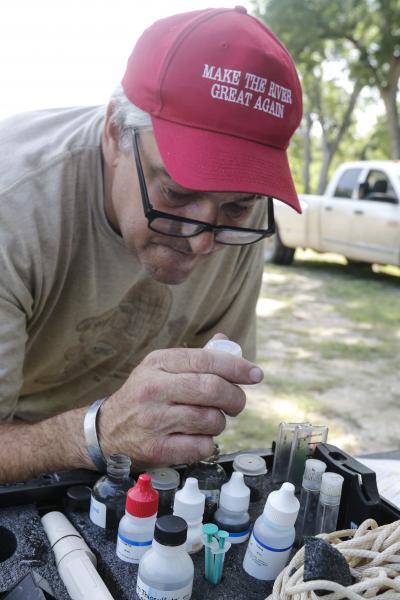
The festival grounds, at Cool River Ranch, abut three counties. Graphic by Colton Ashabranner
Float Fest concerns not limited to traffic congestion
Though it was traffic concerns that ultimately doomed the festival permit for 2019’s Float Fest, Guadalupe County commissioners and members of the public raised other concerns as well at the permit hearing held Thursday morning.
At the hearing, festival organizer Marcus Federman and his attorney Joe Stallone presented their application for the festival permit and discussed last year’s festival and plans for this year.
“We’re looking at this more and more each year as a collaborative process,” Stallone told the commissioners, explaining that they have talked with neighborhoods, the Guadalupe County fire marshal and other officials to coordinate operations.
Federman said that last year, around 17,000 people attended Float Fest. He also noted that he hired a man from a local river watchdog group to lead cleanup efforts during and after the festival. Federman said that approximately 150 people were involved in the cleanup in 2018.
Stallone called last year’s festival a “complete success” and presented affidavits from Hays County Precinct 3 Constable Ray Helm, festival security director Gary Stone, San Marcos-Hays County Battalion Chief Scott Robinson and other experts regarding safety at the festival. He also presented an economic impact study showing that the festival brought in more than $12 million for Guadalupe, Hays and Travis counties.
“2018 was fantastic,” Federman told the commissioners. “I was extremely excited about the outcome of it and all elements of it that were brought together and executed very well. In 2019, I expect an even better festival.”
However, some area residents had other opinions of the 2018 festival. Hugh Fairly, who lives on Cottonseed Run near the festival grounds, noted that on the Monday morning following the festival there were still people leaving the festival grounds, contributing to traffic as area residents took their children to school and went to work. By Monday morning, he said, officers weren’t out performing traffic control.
“We have school buses, we have workers that come down Scull Road,” Fairly said. “... That morning I observed cars coming down the paved road from this fest at 40 and 50 miles an hour. … I’m afraid that there’s going to be a major wreck with mamas and papas taking their kids to school.”
Fairly also noted an issue with the portable toilets on the festival grounds. He said that the toilets were located on the perimeter of the campgrounds, not in the center.
“If you’re camped in the middle of this area, if you’ve got to potty, you’re not going to walk a long ways to go to the bathroom,” he said. “So what do they do? They potty next to their camp.”
Fairly said that he went through the festival grounds on a golf cart after attendees had cleared out and made a discovery: a homemade portable toilet, which he described as a frame with a lid and a bag, right in the middle of the campground.
“Nobody wants to camp next to a porta-potty,” he said.
Precinct 4 Commissioner Judy Cope had brought up the portable toilet issue earlier in the meeting, noting that the county environmental health director had said the toilets were not being cleaned in a timely manner. Federman said that last year, staff kept track of which toilets were used most frequently and planned to add more in those areas.
“We’re going to beef up the number of potties that we have based on where we’re having the most servicing,” he said.
ʻWe find it offensiveʼ
Other residents brought up the perennial festival issue of noise, including profanity. Cottonseed Run resident Dixie Waldrip read the definition of disorderly conduct, which includes “abusive, indecent, profane or vulgar language in a public place.”

Volunteer Kevin Huffaker takes water quality samples during Float Fest 2018, attended by roughly 17,000 people. Daily Record file photo
She said that from her house, “We had to listen to entire songs where the artist had very limited vocabulary. We have children in the neighborhood. This may not have been at the highest decibel, but it was audible. It was not appreciated, and we find it offensive.”
Michelle Rumbaut, who spoke to the commissioners as a resident of Cottonseed Run and discussed traffic concerns, also spoke as a member of the San Marcos River Foundation board. In that capacity, she questioned the wisdom of “perpetually increasing the numbers” of festival-goers given issues with trash and bathrooms and traffic numbers. She also asked the commissioners to support the river foundation at the legislative level as far as working to clarify what she called the “loose and unclear” mass gathering permit process and the creation of a water oriented recreation district to help protect the San Marcos River.
Tom Goynes, who owns a campground on the river, said that on the weekends of the festival, he can’t rent out the wedding chapel on his property or let anyone with children camp there. Instead, he said, “We allow Caldwell County to pretty much take over our campground.”
Search and rescue, DPS and Caldwell County deputies set up on his property in case of an emergency at or near the festival grounds. He asked the organizers to consider giving Caldwell County some money so that he could be compensated for the use of his property.
“We’re not making any money,” he said. “We’re closed.”
He also noted that Caldwell County was left out of the festival’s economic impact study.
“They’re making this $12 million … I noticed Caldwell County wasn’t mentioned in the $12 million.”
ʻItʼs just not worth $12 million’
Guadalupe County Judge Kyle Kutscher questioned the economic impact study itself. The study, conducted by Angelou Economics, stated that Float fest generated $12.3 million for “San Marcos and the surrounding region,” and that attendees occupied about 46 percent of all hotel rooms in San Marcos. The festival created the equivalent of 119 full-time jobs and that $4.2 million in labor income resulted from the festival, according to the study. The state collected more than $620,000 in sales tax revenues, with $49,500 going to Guadalupe County, as a result of Float Fest, the study said.
“I wholeheartedly disagree with some of the information that was presented there,” he said, adding that he had questions about how the researchers tracked the flow of money. “I can tell you … I don’t know where they come up with almost $50,000 coming in to the county.”
Federman said that part of that was from sales tax on the tickets he sells, and other figures were based on responses to a survey of attendees about how much they spent on hotels, restaurants, gas and other expenses.
“Of course, everything is estimated in there,” he said.
Kutscher countered by saying, “We have no hotels that are being utilized in our county; there’s a single convenience store that’s close (to the festival).”
Federman said he would like to work with Guadalupe County to make sure that it benefits from the festival, whether with roads or with the river or another project.
“I am open to that,” he said. “... I want everyone to know that it’s something that I’ve come up with, that I want to do.”
Mike McClabb, a Martindale City Council member, also said he finds no benefit to local taxpayers.
“Who got all that?” he asked of the $12 million cited in the economic impact study. “It sure wasn’t Martindale. … There’s no benefit for the locals. And we pay all the taxes out there.”
Paula Goynes questioned the value of any funds that the festival generates for the local economy.
“Economics isn’t all about money,” she said. “... There’s more to it than that. We need to consider what is really happening here. The locals don’t appreciate it. It’s disruptive during the day, it’s disruptive during the evening, and it’s just not worth $12 million to be subjected to that event all the way around.”
Last year, the Guadalupe County Commissioners Court denied the permit for Float Fest, but organizers filed a lawsuit and the county settled, allowing the festival to go on but with fewer attendees than originally requested.











